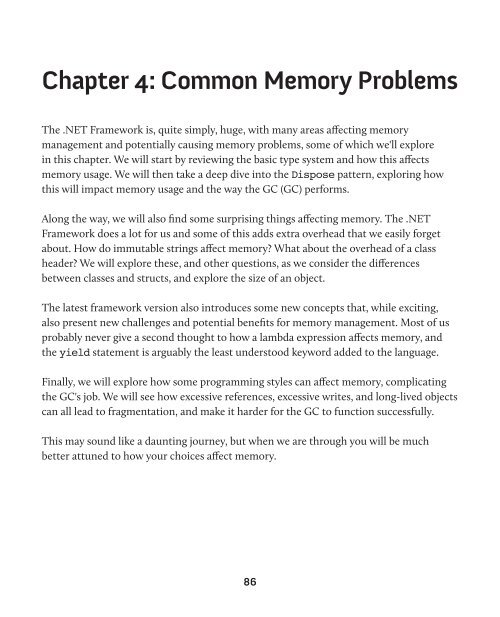Under the Hood of .NET Memory Management - Simple Talk
Under the Hood of .NET Memory Management - Simple Talk
Under the Hood of .NET Memory Management - Simple Talk
Create successful ePaper yourself
Turn your PDF publications into a flip-book with our unique Google optimized e-Paper software.
Chapter 4: Common <strong>Memory</strong> Problems<br />
The .<strong>NET</strong> Framework is, quite simply, huge, with many areas affecting memory<br />
management and potentially causing memory problems, some <strong>of</strong> which we'll explore<br />
in this chapter. We will start by reviewing <strong>the</strong> basic type system and how this affects<br />
memory usage. We will <strong>the</strong>n take a deep dive into <strong>the</strong> Dispose pattern, exploring how<br />
this will impact memory usage and <strong>the</strong> way <strong>the</strong> GC (GC) performs.<br />
Along <strong>the</strong> way, we will also find some surprising things affecting memory. The .<strong>NET</strong><br />
Framework does a lot for us and some <strong>of</strong> this adds extra overhead that we easily forget<br />
about. How do immutable strings affect memory? What about <strong>the</strong> overhead <strong>of</strong> a class<br />
header? We will explore <strong>the</strong>se, and o<strong>the</strong>r questions, as we consider <strong>the</strong> differences<br />
between classes and structs, and explore <strong>the</strong> size <strong>of</strong> an object.<br />
The latest framework version also introduces some new concepts that, while exciting,<br />
also present new challenges and potential benefits for memory management. Most <strong>of</strong> us<br />
probably never give a second thought to how a lambda expression affects memory, and<br />
<strong>the</strong> yield statement is arguably <strong>the</strong> least understood keyword added to <strong>the</strong> language.<br />
Finally, we will explore how some programming styles can affect memory, complicating<br />
<strong>the</strong> GC's job. We will see how excessive references, excessive writes, and long-lived objects<br />
can all lead to fragmentation, and make it harder for <strong>the</strong> GC to function successfully.<br />
This may sound like a daunting journey, but when we are through you will be much<br />
better attuned to how your choices affect memory.<br />
86











